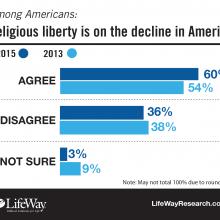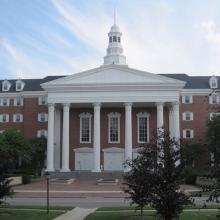ed stetzer
A day after his first speech to Congress, President Trump was still basking in unexpected praise from the public and some pundits, who saw in his delivery a man who finally came across as measured in tone and downright “presidential,” as some put it, even if his few policy prescriptions reiterated the hard line, nationalist agenda that propelled him to office.
But there is one key constituency that might not be as enamored with the address: social conservatives, whose support was arguably most critical to Trump’s election.
Exit polls suggest 81 percent of white evangelicals voted for President-elect Donald Trump.
But support for Trump may have been less decisive on Christian college campuses, where most students are also white evangelicals.
A Washington Post/ABC News poll, before the election, found the views of younger adults do not align with some older ones, when it comes to their beliefs about Trump supporters.

Image via LifeWay Research
Most U.S. adults say religious liberty is declining in America and Christians face more intolerance than ever. But nearly 4 in 10 also say Christians “complain too much about how they are treated,” according to a new LifeWay Research survey.

Image via LifeWay Research/RNS
Sometimes a call from God is not enough to keep a pastor in his post.
Many evangelical pastors who quit before retirement age found “another calling” either off the pulpit or out of ministry altogether. But many also say they were driven away by conflict and burnout. So says a new survey of former pastors from four denominations.
According to a recent poll by The Associated Press and the University of Chicago’s National Opinion Research Center, 82 percent said religious liberty protections were important for Christians, compared with around 60 percent who said the same for Muslims and the religiously unaffiliated.
Yet, religious freedom is not merely an important issue — it is our “first freedom.” What Americans, especially Christian Americans, must understand is this: Religious freedom for some is not religious freedom for long.
Rejecting fearmongering about the resettlement of Syrian refugees in the U.S., about 100 evangelical leaders are calling on Christians and their churches “to support ministries showing the love of Jesus to the most vulnerable, those in desperate need, and the hurting.”
“Our statement is to change a narrative of fear and instead focus on faith and compassion,” said Ed Stetzer, executive director of LifeWay Research in Nashville, Tenn. “Our desire is not to resettle everybody in another country. When a house is burning down, we need to put out the fire and rescue people fleeing the fire.”

Image via LifeWay Research / RNS
December means curtains up for church Christmas pageants, hand-bell concerts, caroling kiddie choirs, and Nativity displays on the front lawns.
But the No. 1 reason most U.S. adults — Christians and many unbelievers, too — give for going to church at Christmastime is to “honor Jesus,” according to a new survey from the evangelical research agency LifeWay Research.
More than three in four of churchgoers (77 percent), Protestants and Catholics alike, said they were drawn to attend church to honor the birth of their savior, the fundamental religious experience of Christmas above and beyond all the seasonal fa-la-la-la-la.
On the Rev. Martin Luther King Jr.’s birthday (Jan. 15), just as the civil rights drama Selma was nominated for best picture in the Oscar race, one fact of American life was little changed.
Sunday morning remains, as King once observed, the most segregated hour in America. And, against a backdrop of increased racial tensions, new research shows that most Americans are OK with that.
Two in three (66 percent) Americans have never regularly attended a place of worship where they were an ethnic minority, according to new polling analysis released by LifeWay Research.
“People like the idea of diversity. They just don’t like being around different people,” said Ed Stetzer, executive director of the Nashville, Tenn.-based research firm.
“Maybe their sense is that church is the space where they don’t have to worry about issues like this,” he said. But that could be a problem, because, Stetzer said, “If you don’t like diversity, you’re really not going to like heaven.”
If you’re dismayed that one in five Americans (20 percent) are “nones” — people who claim no particular religious identity — brace yourself.
How does 38 percent sound?
That’s what religion researcher David Kinnaman calculates when he adds “the unchurched, the never-churched and the skeptics” to the nones.
He calls his new category “churchless,” the same title Kinnaman has given his new book. By his count, roughly four in 10 people living in the continental United States are actually “post-Christian” and “essentially secular in belief and practice.”
If asked, the “churchless” would likely check the “Christian” box on a survey, even though they may not have darkened the door of a church in years.
Kinnaman, president of the California-based Barna Group, slides them into this new category based on 15 measures of identity, belief and practice in more than 23,000 interviews in 20 surveys.
The research looked at church worship attendance and participation, views about the Bible, God and Jesus, and more to see whether folks were actually tied to Christian life in a meaningful way or tied more by habit or personal history.
In recent surveys, the religious “nones” — as in, “none of the above” — appear to lead in the faith marketplace. In fact, “none” could soon be the dominant label U.S. adults pick when asked to describe their religious identity.
And, researchers say, this is already making nones’ attitudes and opinions less predictably liberal on social issues.
“DOMA is dead.”
Such were the chants heard outside the United States Supreme Court yesterday when it was announced that the highest judicial body in the nation voted 5-4 to strike down the Defense of Marriage Act (DOMA). That’s right. As of yesterday, there is no longer a federal law defining marriage as a union between a man and woman.
Of course, not every American is roundly rejoicing. Responses from the Christian community, which has become more divided over the issue in recent years, are mixed. Conservative Christians seem mostly despondent while the progressives among them are mostly celebrating. I spoke with several prominent Christians from across the political spectrum today to get their reactions to the Court’s decision:
Images from Day 1 of the 2012 Q Conference in Washington, D.C., Tuesday April 10, with speakers including Sojourners CEO Jim Wallis, philanthropist Roberta Ahmanson, the Rev. Joel Hunter, researcher Ed Stetzer, NYT columnist Ross Douthat, Michael Cromartie and Q founder Gabe Lyons.
Share the gospel at all times, and when necessary use words.
The phrase is usually attributed to St. Francis of Assisi and is often invoked by the timid Christian, the too-cool hipster Christian, and basically every Christian ever who is afraid of evangelism.
Ed Stetzer—president of LifeWay Research, speaking from the Q conference on Tuesday—said there are two problems with that statement: it’s not true, and Assisi never said it.
“We don’t want to separate those two because biblically we can’t, and statistically we don’t,” Stetzer said.







